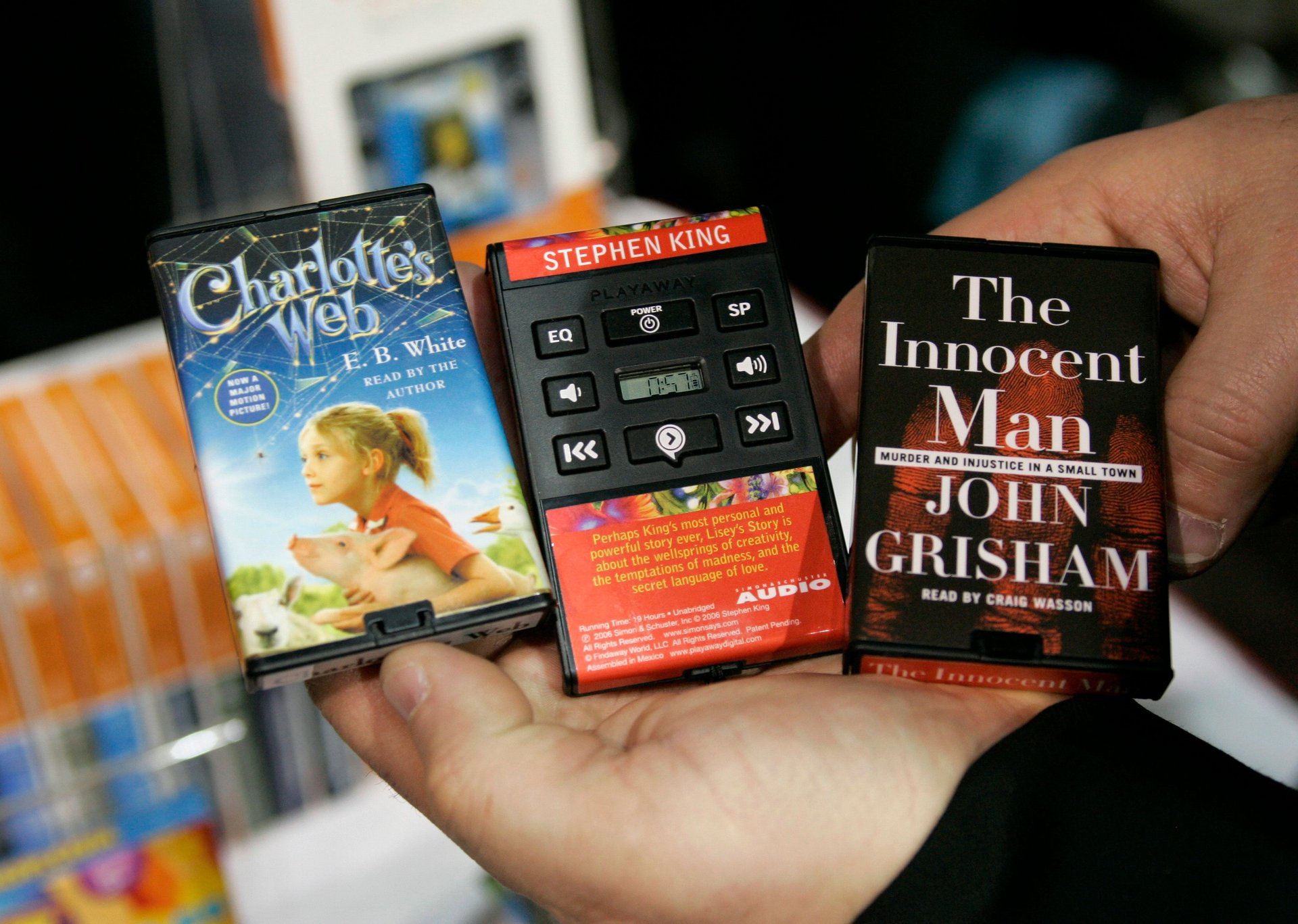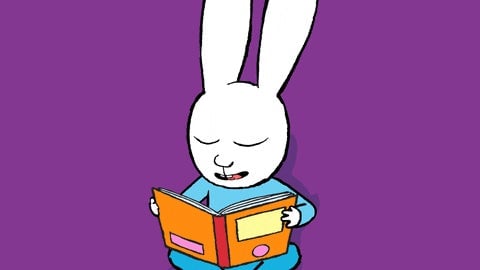Audiobooks: Reading allowed
Commuter boredom turned billion-dollar industry

Listen closely
Suggested Reading
Thomas Edison dreamed of audiobooks.
Related Content
When Edison invented the phonograph in 1877, he tested his new device by reciting the nursery rhyme “Mary Had a Little Lamb.” That wasn’t highbrow literature, but Edison felt that the recorded form would lend itself well to full-length books, too—and that some books, perhaps, were meant to be heard rather than seen. “The advantages of such books over those printed are too readily seen to need mention,” Edison wrote in the literary journal North American Review. “Such books would be listened to where now none are read.”
The phonograph, and later the record player, was instrumental in spurring the music industry, but the audiobook business didn’t sprout up until a full century after Edison’s invention.
Now, they’re a billion-dollar industry, a normalized way for readers to consume books, and an unavoidable facet of literary life. In 2022, audiobooks brought in $1.8 billion in the US on the heels of a decade of double-digit revenue growth and corporate investment (not only by major publishers but also tech giants like Amazon, Apple, Google, and Spotify.)
So, what can stop audiobooks from becoming the future of reading? Nothing. Audiobooks are versatile, enriching, transformative and—at times—really fun. So leave any prejudice that it’s not real reading at home.
Take a walk, put your headphones in, and listen to something great.
By the digits
$5.3 billion: Global revenue for audiobooks in 2022
$35 billion: Projected global revenue for audiobooks in 2030
57%: Share of audiobook listeners between the ages of 18 and 44
49%: Share of the US population that is between the ages of 18 and 44
0.60-3.00x: Playback speed range in the Libby app
100: Books you can read in a year if you want, especially if you embrace formats like audiobooks
Origin story
A driving ambition
In 1975, Duvall Hecht was frustrated and bored by his long daily commutes between his home in Newport Beach, Calif., and his investment banking job in Los Angeles.
Hecht, a former Olympic gold medalist in rowing, found what we could call early audiobooks: recordings of books made for blind people. He popped the recordings into a reel-to-reel tape recorder placed on his passenger seat, but quickly exhausted his supply.
He figured he’d just record his own on cassette. He started with nonfiction—George Plimpton’s football tale Paper Lion, which became the first of a massive catalog produced by his new company, Books on Tape.
Books on Tape became a household name and a pioneer of the form. Hecht sold his company—and its catalog of 6,000 tapes—to publisher Random House for $20 million in 2001.
Explain it like I’m 5!
Read how you want to read
One of the biggest annoyances for any audiobook reader is the constant insinuation—by, well, haters—that listening to audiobooks doesn’t “count” as reading.
In fact, we’ve been hardwired through the ages to read aloud—and to listen when others read aloud to us. In Saint Augustine’s Confessions (published around 400 CE), he remarked how strange it was that Saint Ambrose read silently to himself. So, what’s with the snobbishness around audiobooks? Is it something about the way we understand the words being conveyed? Unfortunately, there isn’t robust academic research into reader comprehension of audiobooks as compared to print books, though numerous studies show that audiobooks are a boon to new language learners (pdf), struggling visual readers (pdf), and younger readers.
Listen to me
Enter Spotify
If you’re listening to an audiobook, there’s a decent chance it’s on Amazon’s platform Audible, which commands a 65% market share, according to one estimate. Apple and Google are players too, selling books as one-offs instead of Audible’s subscription model. But another subscription giant is getting into the arena—Spotify.
Spotify launched its audiobooks business in 2022, but clashed with Apple over the iPhone maker’s 30% fee for in-app purchases. For its next act, Spotify is going to let subscribers listen to 20 hours of audiobooks per month before rolling out any new subscriptions. (One fitting listen is musician Dave Grohl reading his memoir The Storyteller in just over 10 hours.) This will buy Spotify some time as it figures out the best way to get its subscribers hooked on audiobooks without losing a big bite of the proceeds to Apple.
If the business of audiobooks is a headache, or subscribing stresses your digital wallet, there’s a much cheaper way to listen: Check whether your local library uses Libby or another app—and get your audiobooks for free.
Brief history
1883: Evert Nymanover proposes a new machine that will read books aloud from inside of a hat.
1923: Frank L. Dyer patents the “talking machine record,” noting its uses for the blind.
1931: US Congress passes the Pratt-Smoot Act providing $100,000 to the Library of Congress to fund a program called Books for the Adult Blind.
1952: The audio publisher Caedmon launches with Dylan Thomas’s A Child’s Christmas in Wales, sometimes considered the first audiobook. Caedmon was acquired by HarperCollins in 1987.
1995: Audible is founded and introduces a portable media player called the Audible MobilePlayer.
2008: Amazon, which had previously invested in Audible, buys it for $300 million.
Fun fact!
Apple recently unveiled a suite of artificial intelligence-narrated audiobooks, sparking outrage but also signaling a lower-cost way to scale up for an expected boom in demand. Critics say that narrators are what make a great book, well, a great audiobook.
Pop quiz

Reading aloud has traditionally played a part in the work of what type of factory, so much so that its products have often been named after characters or authors of great books?
A. French shoes
B. Portuguese cork
C. Cuban cigars
Keep reading, preferably aloud. You’re almost at the end, where you’ll find the answer.
Quotable
“We will lose something very stirring in the American tradition when we walk upstairs to find our kids listening to Mark Twain on headsets.”
—Jonathan Kozol, author of Illiterate America, in a 1985 New York Times interview
Poll

Have you lost something very stirring by walking upstairs to find your kids listening to Mark Twain on headsets?
- No, I stood in the doorway and whispered, “I did it, I spawned geniuses.”
- Yes, and they were grounded for a month for daring to defy the sanctity of the printed page.
- LOL you meant Minecraft, right?
Read those answers aloud, but then tell us the answer by clicking here.
💬 Let’s talk!
In our last poll about margin calls, 57% of you said the riskiest thing you’ve ever done was buy a house with a 7% interest rate, 10% of you said it was investing heavily in meme stocks, and 32% said it was giving yourself bangs, which we hope you have now learned is always a bad idea, no matter how easy an online tutorial makes it look.
Today’s email was written by Scott Nover (hears books in his sleep), edited by Susan Howson (has some recommendations for you), and produced by Annaliese Griffin (more of a visual reader, but loves an audiobook in the car).
The correct answer to the pop quiz is C., Cuban cigars. A lector would entertain cigar rollers by reading great works of literature. May we recommend the audiobook Of Women and Salt by Gabriela Garcia, which features this prominently?